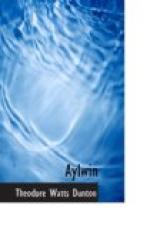When I parted from you I should have been blind indeed had I failed to notice how scornfully you repudiated my suggestion that you should replace the amulet in the tomb from which it had been stolen. I did not then know that the tomb was your father’s. Had I known it my suggestion would have been much more emphatic. I saw that you had the greatest difficulty in refraining from laughing in my face when I said to you that you would eventually replace it. Yes, you had great difficulty in refraining from laughing. I did not take offence. I felt sure that the cross was in some way connected with the young lady you had lost in Wales, but I could not guess how. Had you told me that the cross had been taken from your father’s tomb I should no doubt have connected it with the cry of ‘Father’ which had, I knew, several times been uttered in Wilderspin’s studio by the model in her paroxysms, and I should have earlier done what I was destined to do—I should earlier have brought you together. From sympathy that sprang from a deep experience I knew you better than you knew yourself. When I learnt from Sinfi Lovell that you had fulfilled my prophecy I did not laugh. Tears rather than laughter would have been more in my mood, for I realised the martyrdom you must have suffered before you were impelled to do it. I knew how you must have been driven by sorrow—driven against all the mental methods and traditions of your life—into the arms of supernaturalism. But you were simply doing what Hamlet would have done in such circumstances—what Macbeth would have done, and what he would have done who spoke to the human heart through their voices. All men, I believe, have Macbeth’s instinct for making ‘assurance doubly sure,’ and I cannot imagine the man who, entangled as you were in a net of conflicting evidence—the evidence of the spiritual and the evidence of the natural world—would not, if the question were that of averting a curse from acting on a beloved mistress, have done as you did. That paralysis of Hamlet’s will which followed when the evidence of two worlds hung in equipoise before him, no one can possibly understand better than I. For it was exactly similar to my own condition on that never-to-be-forgotten night when she whom I lost...
While the marvellous sight fell, or appeared to fall, upon my eyes, my blood, like Hamlet’s, became so masterful that my reason seemed nothing but a blind and timorous guide. No sooner had the sweet vision fled than my reason, like Hamlet’s, rose and rejected it. It was not until I became acquainted with the rationale of sympathetic manifestations—it was not till I learnt, by means of that extraordinary book of your father’s, which seems to have done its part in turning friend Wilderspin’s head, what is the supposed method by which the spiritual world acts upon the material world—acts by the aid of those same natural bonds which keep the stars in their paths—that my blood and my reason became reconciled, and a new light came to




